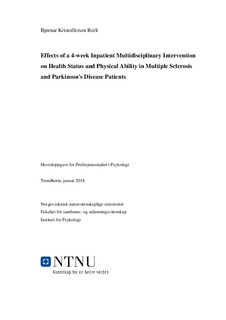Effects of a 4-week inpatient multidisciplinary intervention on health status and physical ability in multiple sclerosis and Parkinson's disease patients
Master thesis
Permanent lenke
http://hdl.handle.net/11250/2505968Utgivelsesdato
2018Metadata
Vis full innførselSamlinger
- Institutt for psykologi [3108]
Sammendrag
Objectives: The study has two objectives: (1) Investigate the effects of a multidisciplinary intervention (MDI) for multiple sclerosis (MS) and Parkinson's disease (PD) patients on physical ability and self-perceived health status. (2) Examine the relationship between physical ability and health status in these patient groups.
Methods: 110 patients (44 with PD, 66 with MS) were enrolled in a 4-week inpatient MDI program. Measures of health status (SF-12) and physical ability (6-minute walking, timed up-and-go test, and sit-to-stand test) were administered before and after intervention.
Results showed significant improvements on physical performance (low to moderate effect sizes) and increased physical and mental health status (moderate to strong effect sizes) in both patient groups. Physical health status (PCS) correlated significantly with all three physical tests (Pearson's r between 0,28 and 0,48). Physical test scores showed a significant predictive value on PCS, explaining 11-14% of the variance.
Conclusion: MS and PD patients seem to benefit in the short term from a multidisciplinary intervention, improving both objective and subjective perceptions of health. As expected, physical ability was closely related to perceived physical health, but not mental health, highlighting the importance of addressing psychological symptoms separately in treatment. The study supports a holistic multidisciplinary approach to treatments for PD and MS patients.
